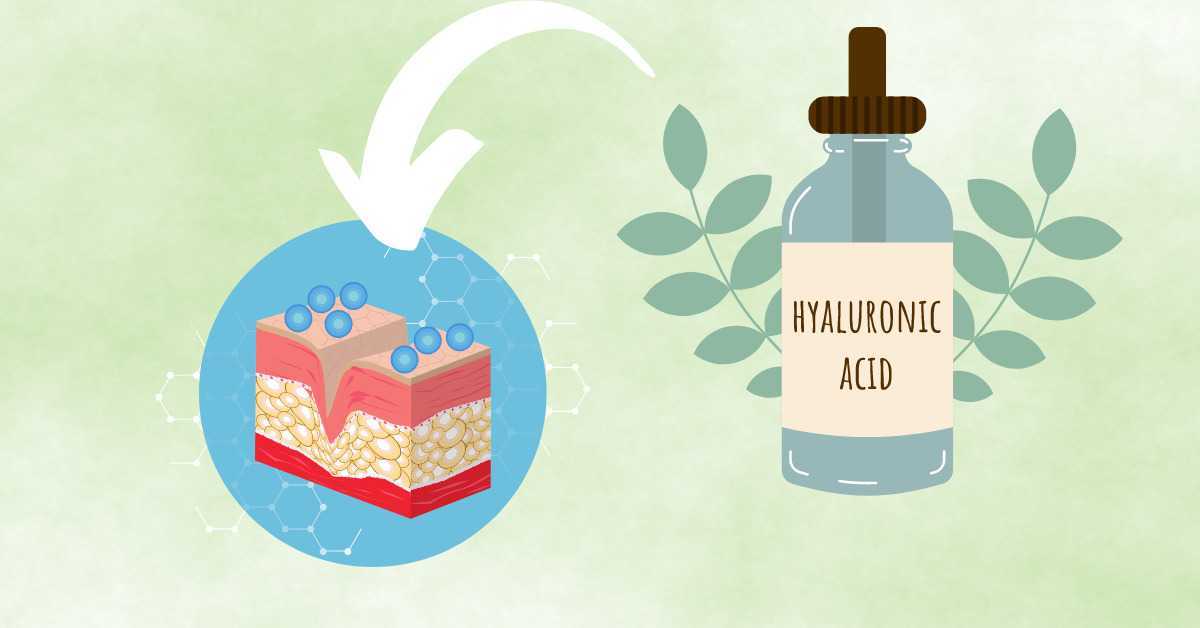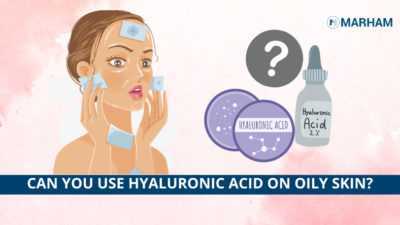Oily skin can be difficult to manage especially during the summers when the sun is at its peak. A product that keeps your skin hydrated yet does not produce oil can be a blessing in this situation.
So, you might be wondering is hyaluronic acid good for oily skin if you have this skin type. Well, the answer could be yes or no, but you can definitely find it in this blog.
Let’s discuss everything you need to know about hyaluronic acid and if you should use it for oily skin or not.
What is Hyaluronic Acid?
Hyaluronic acid is a substance that’s found naturally in the human body. It’s present in large amounts in the joints and skin, and it helps keep these tissues lubricated and hydrated.
The body’s production of hyaluronic acid declines with age, which can lead to drier skin and less cushioning for the joints. This decline is thought to contribute to the aging process.
HA can be injected into the skin or taken as a supplement. It’s also found in some skincare products, such as serums and creams.
When applied to the skin, HA can help reduce wrinkles and improve skin hydration. When taken as a supplement, it may help to lubricate the joints and reduce pain.
There is some evidence to suggest that HA supplements can help with osteoarthritis, but more research is needed. Overall, HA is considered safe and effective for most people.
Get 50% off on Hydra Facial only through the Marham app!
Why Does Your Skin Get Oily?
Your skin produces oil to protect itself from environmental irritants and to keep your skin hydrated. If you have oily skin, it means that your skin is producing too much oil. Oily skin is more prone to acne because the excess oil can clog your pores.
There are a few things that can cause your skin to produce too much oil. One is hormones. If you’re going through puberty or taking certain medications, your hormone levels can increase and cause your skin to produce more oil.
Another common cause of oily skin is using the wrong face products. If you’re using products that are too heavy or greasy, they can actually make your skin oilier.
If you have oily skin, there are a few things you can do to help control oil production. One is to use oil-free or non-comedogenic products. These products won’t clog your pores and will help to keep your skin from getting too oily.
Also, see Hyaluronic Acid Fillers for Facial Rejuvenation.
So, Is Hyaluronic Acid Good for Oily Skin?
Now, coming to the main concern is Hyaluronic Acid Good for Oily Skin? Oily skin is often associated with breakouts, shine, and enlarged pores.
Hyaluronic acid is a substance that occurs naturally in the skin and helps to keep it hydrated. Although it is often used as a treatment for dry skin, some people believe that it can also be beneficial for oily skin.
According to research, hyaluronic acid is an effective treatment for people who have excessive sebum production in their sebaceous gland. Therefore, it can be helpful for those with oily skin.


Benefits of Hyaluronic Acid for Oily Skin:
There are a few ways that hyaluronic acid can help to improve the appearance of oily skin including:
1. Can help to reduce the size of pores:
Hyaluronic acid can help to reduce the size of pores by hydrating the skin and making it appear plumper. This can make pores appear smaller.
2. Can help to control shine and oil production:
Hyaluronic acid can help to control shine and oil production by keeping the skin hydrated. When the skin is properly hydrated, it is less likely to produce excess oil.
3. Can help to hydrate the skin and prevent breakouts:
Hyaluronic acid can help to hydrate the skin and prevent breakouts by keeping the skin moisturized. Dry skin is more prone to breakouts, so keeping the skin hydrated can help to reduce this risk.
Check out the 5 Best Dermatologists in Lahore.
What Products Contain Hyaluronic Acid?
So, is hyaluronic acid good for oily skin? Yes, it is but which products contain it? There are many different products on the market that contain hyaluronic acid. You can find it in serums, creams, lotions, and even foundations.
Shopping Tips for People with Oily Skin:
- Read Labels: It is important to read the labels of these products carefully to ensure that you are getting a quality product that will work well for your oily skin type.
- Know what you are looking for: When shopping for products that contain hyaluronic acid, it is important to look for those that are specifically designed for your face. These products will usually be labeled as “anti-aging” or “wrinkle-reducing”.
- Go Oil-free: You should also look for products that are oil-free, as this will help to keep your skin from becoming too greasy.
- Not a miracle: Finally, it is important to remember that hyaluronic acid is not a miracle cure for all of your skin problems. It can help to reduce the appearance of wrinkles and fine lines, but it will not completely eliminate them.
The Bottom Line
Hyaluronic acid is an amazing ingredient that can help to regulate oil production, hydrate the skin, and improve the overall appearance of your complexion.
Struggling with oily, acne-prone skin, you can incorporate a product with hyaluronic acid into your skincare routine. However, it is always best to consult a dermatologist especially if you have sensitive skin.
If you’re concerned about your skin’s oiliness, a dermatologist can help you find the best products for oily skin and give expert advice on how to use them.
Can’t Find the App?
| Android | IOS |
|---|---|
  |
  |
FAQs
Does hyaluronic acid make oily skin worse?
This is a common misconception about hyaluronic acid, but actually, it can help to regulate oil production in the skin/ When used correctly, hyaluronic acid can help to hydrate the skin without making it oily or causing breakouts.
Which acid is best for oily skin?
There are a variety of acids that can be beneficial for oily skin, including glycolic acid, lactic acid, and salicylic acid. Glycolic acid helps to exfoliate the skin and remove excess oil. Lactic acid is an alpha hydroxy acid that helps to hydrate the skin and reduce sebum production.
Will hyaluronic acid clog pores?
Hyaluronic acid is a large molecule that is too big to penetrate the skin’s surface and clog pores. In fact, hyaluronic acid can actually help to keep pores clear by drawing moisture to the surface of the skin and providing hydration.

